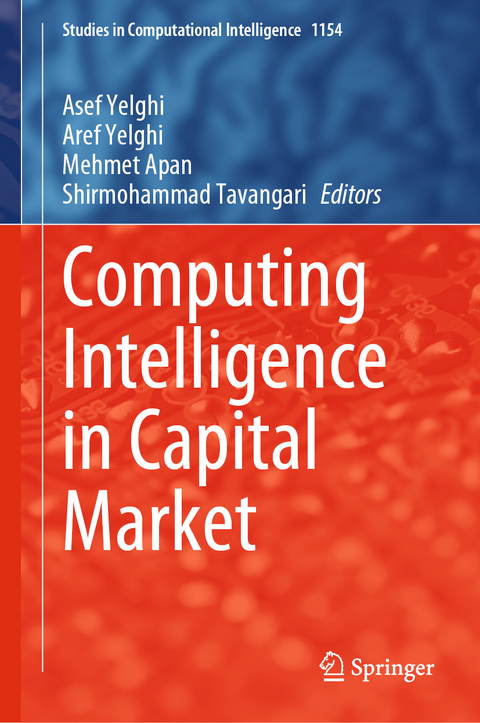
Computing Intelligence in Capital Market
Springer International Publishing (Verlag)
978-3-031-57707-9 (ISBN)
The book is divided into sections according to the content of the chapters. The first section covers AI concepts with NP and financial issues. The second section covers AI techniques in relation to Fintech issues. The remaining sections are implementation and analysis. As science and technology development and algorithms are widely used in various fields, their influence and development have increased efficiency and productivity. The introduction of algorithms in the financial field has not been an exception to this. In recent years, the growth and development of the financial system have been in sync with the growth of technology. Fintechs were born at the intersection of these two sectors. What happens through the application of computer knowledge in the financial field, or the examination of the efficiency and effectiveness of their use and the interaction and combination of these two fields has been written very infrequently in the majority of books. In Fintech, there are problems that researchers focus on such as customer support, portfolio management, trading algorithms, fraud detection, credit risk assessment, insurance, and wealth management. The mentioned problems are complex and are mapped to NP problems in the field of artificial intelligence. In the last two decades, optimization algorithms, neural networks, and deep learning have been widely applied in many scientific and engineering fields to solve the mentioned problems. The purpose of this book is to provide the reader with the most used artificial intelligence methods for scientific and engineering problems. This book is used by students, scientists, and practitioners in various fields. The chapters are self-explanatory, and the reader can read each one separately. They describe the algorithm used, the chosen problem, and the implementation. In addition, practical examples, comparisons, and experimental results are presented.
Asef Yelghi was born in Iran on September 19, 1986. After graduating from Technical and Vocational College in the field of accounting, he graduated from Shahid Chamran Technical and Vocational College and Hakim Corcani Private University with a bachelor's degree in the same field. He was accepted into the stock exchange and capital market department at Marmara University in Turkey in 2012 and completed his master's degree in 2014. Additionally, he received two doctorates in the fields of banking and business, graduating in 2020 in the field of business and 2021 in the field of banking.
Aref Yelghi was born in 1986. He received his B.S. degree in Software Engineering from Mirdamad University in Iran. He also received his master's degree in computer science from the Islamic Azad University of Sari branch in Iran and his Ph.D. degree in computer engineering from Karadeniz Technical University in Turkey. His research interests include optimization, neural networks,and data mining.
Mehmet Apan was born on April 29, 1970, in Turkey. He graduated from Istanbul University, Faculty of Political Sciences, Department of Public Finance, in 1993 with a bachelor's degree. In 2002, he received two master's degrees in Social Politics from Istanbul University and Business from Sakarya University in Turkey. He also received his doctorate degree in Finance and Banking from Kadir Has University in 2013. He currently works as an associate professor at Sakarya University of Applied Sciences.
Shirmohammad Tavangari is a research scientist at the University of British Columbia in Canada. He graduated from the Sharif University of Technology in Iran and has had the privilege of working at esteemed institutions such as Stanford University, Harvard University, and the National University of Singapore. He actively contributes to the academic community as an editorial board member for a journal and a reviewer for various journals, including Elsevier, Springer, and Oxford Academic. Additionally, he participates as a technical program committee (TPC) member and reviewer in numerous IEEE conferences, totaling over 30 engagements. He had the honor of being a TED speaker at TEDx Sanabad and is a recipient of the Young Scientist Award from the INSO Awards 2022.
.- 1. Estimating and Evaluation of International Capital Movements in The Perspective of Corporate Economic Geography.
.- 2. Wave Net-TSRS Model for Timeseries Prediction in Finance.
.- 3. Integrating Decision Analytics and Advanced Modeling in Financial and Economic Systems through Artificial Intelligence.
.- 4. Co-movements between Bitcoin and Gold: Multivariate BEKK-GARCH Models.
.- 5. An Approach for backtesting and algorithmic trading with liquidity and Hill Climbing algorithm.
.- 6. Unleashing Economic Potential: Exploring the Synergy of Artificial Intelligence and Intelligent Automation.
| Erscheinungsdatum | 30.04.2024 |
|---|---|
| Reihe/Serie | Studies in Computational Intelligence |
| Zusatzinfo | V, 65 p. 19 illus., 13 illus. in color. |
| Verlagsort | Cham |
| Sprache | englisch |
| Maße | 155 x 235 mm |
| Themenwelt | Informatik ► Theorie / Studium ► Künstliche Intelligenz / Robotik |
| Technik | |
| Wirtschaft ► Betriebswirtschaft / Management ► Finanzierung | |
| Wirtschaft ► Betriebswirtschaft / Management ► Marketing / Vertrieb | |
| Schlagworte | Artificial Neural Networks • Capital Market Intelligence • Computational Intelligence • Deep learning • evolutionary algorithms • Financial Intelligence • Financial Markets • financial portfolio management • Financial Services • Fintech, Risk Management • Optimization • Portfolio Analytics Software • Swarm intelligence • Trading Software Development • Werth Management |
| ISBN-10 | 3-031-57707-8 / 3031577078 |
| ISBN-13 | 978-3-031-57707-9 / 9783031577079 |
| Zustand | Neuware |
| Haben Sie eine Frage zum Produkt? |
aus dem Bereich


